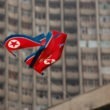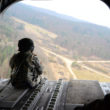In Max Frisch’s play The Fire Raisers, the respectable Herr Biedermann prefers to accept the palpably thin excuses that his tenants offer as they haul wagonloads of incendiary materials into his house, because that is easier than taking any action.
Something like that is happening now. While the congressional and media types who magnify molehills of U.N. peccadilloes into mountains of scandal often piously invoke the need to reform the United Nations, their real and often overtly stated intention is to overthrow the world organization, its charter, and the whole corpus of international law, multilateral treaties and conventions that support its purpose. Insofar as they have a transitional program, it is to undermine the principles behind the institution, and bend it to conform to Washington’s increasingly flexible perceptions of international law.
There is an Anglo-Saxon tendency to defer to people who hold sincere and fervent beliefs, so perhaps it is worthwhile to establish the essential irrationality of these U.N. detractors, measuring them not against any highfalutin ideas of international peace and brotherhood, but against the interests of the United States that Congressman Henry Hyde (R-IL), Senator Norm Coleman (R-MN) and the like so often invoke.
ORPHANING THE U.N.—To begin with, the United Nations was essentially a creation of the United States, designed to American specifications, and has largely served American interests. Washington usually gets what it wants from the U.N.—and especially so when what it wants is consonant with international law. More to the point is that the U.S. veto effectively stops the U.N. from ever doing anything that Washington does not want.
In years past, the U.N. has blessed the first Gulf War, maintained sanctions against Iraq and Yugoslavia, and, more recently, begun to put the squeeze on Syria, all at the behest of Washington. Even though it failed to win the organization’s support for the invasion of Iraq in 2003, the U.S. shortly afterward persuaded the Security Council to let it have some Oil for Food surpluses and confiscated Iraqi funds.
There is some consolation in the fact that the U.N. baiters still feel the need to disguise their intentions, because despite the concerted media assault on the U.N., polls consistently show that a majority of Americans tend to support it. However, they tend to be diffident in their enthusiasm. In the missing question box at the end of most polls, they tend to tick “No” or “Undecided” if asked “Are you going to do anything about it?”
In contrast, for a significant and vociferous minority of their compatriots mention of the United Nations switches off the higher mental faculties in the same way that “terrorism” does. What they see is not a complex organization and process for helping the peoples and nations of the world take common or concerted action against global problems. They see a bogeyman, something to frighten children at night, or more usually, to get eccentrics to write checks for the causes of those preying on the fears. Since all human life is on the agenda somewhere in the U.N. system, the organization has considerable potential to incite many of the more excitable citizenry into paroxysms of rage.
Birth control, abortion, guns, (other people’s) weapons of mass destruction, attacks on Israel, U.N. Heritage sites, child soldiers, the Law of the Sea: there is no end to the perceived threats to American sovereignty.
COURTING THE WACKO VOTE—American “exceptionalists,” from the neocons like Richard Perle to the paleocons like John Bolton and his former patron Jesse Helms, are not talking idly. They firmly believe that the U.S. does not have to follow any externally mandated rules, and they can call upon hosts of supporters to back them up almost anytime they hit at the U.N.
Michael Scanlon, the former aide to Representative Tom DeLay (R-TX), provided the perfect description of the methodology used by groups like the National Rifle Association (NRA) to tap into this subculture. Scanlon, who misused Indian tribes’ money to further his political schemes, describes the process perfectly.
“Our mission is to get specifically selected groups of individuals to the polls to speak out against something. To that end, your money is best spent finding them and communicating with them on using the modes that they are most likely to respond to. Simply put, we want to bring out the wackos to vote against something and make sure the rest of the public lets the whole thing slip past them. The wackos get their information form [sic] the Christian right, Christian radio, mail, the internet, and telephone trees.”
If you want to see the process at work, look no further than than NRA leader Wayne LaPierre on the gun group’s StopUNGunBan.org website, which urges people to buy his book The Global War on Your Guns, and perhaps more pertinently, inveighs against the U.N. as the “new face of global socialism.”
No matter how many reassurances the world body had issued that it was no threat to the internal sale of weapons under any interpretation of the U.S. Constitution’s Second Amendment, the NRA went ahead and took a cheap shot at the U.N. This is the mind-set of many Americans: when things go wrong internationally it is always the U.N.’s fault.
Similarly, oil company lobbyists inveighing against the ratification of the Kyoto Protocol, which seeks to control greenhouse gas emissions, can drill into the same rich wells of prejudice. While the companies offer the superficially more sophisticated argument that science has not yet demonstrably proven that the emissions cause global warming, the potent subtext is that the rejection of Kyoto and the refusal to control emissions are somehow a patriotic reaffirmation of sovereignty rather than a self-destructive demonstration of gluttony.
As senseless as the attacks can be, they can have their effects. The inflated and incendiary allegations over Oil for Food, fanned in exactly the same wacko wildfire mode, managed to divert the attention of Kofi Annan from management reforms, while driving popular American support for the U.N. to an all-time low.
It is illustrative that while for over a year columnists were flinging mud at the U.N. over allegations of corruption and abuse in the handling of Oil for Food revenues, they lost interest as soon as a report by Paul Volcker showed that it was governments and private companies that were the guilty parties. They showed no interest at all when a Bush-appointed auditor confessed that he could not track what had happened to the $10 billion in Oil for Food surpluses that the U.N. had handed over to the American occupation authorities for Iraqi redevelopment.
U.N. HATERS AT THE HELM—There are immediate, short-term effects of the peculiar American hostility to the U.N. ranging from the petty, such as the grandstanding efforts of some New York State legislators to frustrate the rebuilding plans for the U.N. headquarters in Manhattan, to the profound, such as the time the U.S. threatened to veto sending reinforcements to the peacekeepers during the Rwanda genocide, because the Clinton administration did want to ask Congress for the money.
In the longer term, the anti-U.N. lobby has hobbled the signature of the U.S. on major international conventions, often despite the wishes of the State Department or the incumbent in the White House.
As a result, sometimes the U.S. fulfills the terms of treaties but refuses to ratify them, as happened with the Comprehensive Test Ban Treaty. Or it signs treaties, but then sends signals that it does not intend to carry out its obligations to fulfill the promised terms, as it did with the Nuclear Nonproliferation Treaty. The U.S. now claims the right to cherry-pick which parts of international laws and conventions it intends to abide by. So, while hinting at war to stop Iran’s legal, if dangerous, moves toward uranium enrichment, the U.S. offers India a deal in total violation of the Nonproliferation Treaty that it is citing against Iran.
Then again, in 2004 the Pentagon and Senator Richard Lugar (R-IN), the chair of the Foreign Relations Committee, pushed passage of the International Treaty on the Law of the Sea, but they were thwarted by the “backwoodsmen” in Congress, the isolationists who saw it as yet another pernicious attempt at global government. The U.S. Navy actually wanted it ratified because it would give them more freedom of passage, but such pragmatic considerations could not overcome the prejudices of the exceptionalists.
The Bush administration has taken disdain for the U.N. to previously unimaginable heights. Perhaps the most egregious gesture of official deference to the anti-U.N. lobby has been the appointment as U.S. ambassador to the U.N. of the belligerent John Bolton, who had spent decades denouncing the organization and calling for the U.S. to leave it.
His appointment by Bush while Congress was not in session gave an official blessing to the decades-long campaign against the U.N. by the conservative movement. In a similar vein, Christopher Burnham, currently in charge of the U.N.’s management and administration, and a former Bush administration official and fundraiser, actually thanked President Bush for his appointment last year, overlooking the fact that, nominally at least, U.N. Secretary General Kofi Annan had appointed him.
“I came here at the request of the White House. My primary loyalty is to the United States of America,” Burnham told the Washington Post, seemingly unaware of the oath that an international civil servant such as himself takes on appointment, giving up national loyalties. It is worth noting that for decades during which American media and politicians have berated the U.N. for “waste, mismanagement and corruption,” the U.N. official in charge of management has always been an American presidential appointee.
WORLD COURT WARS—The campaign against the International Criminal Court, which was spearheaded by John Bolton, exemplifies how prejudices and irrational fears militate against real American diplomatic interests while exhibiting to the world the U.S.’s brand of overt nationalism. The U.S. “unsigned” the treaty establishing the Court, setting Washington at loggerheads with allies across the world, including all the members of the European Union. It refused to consider using the Court for the trial of Saddam Hussein, which would have saved both the American and the new Iraqi administrations no end of grief. Recently, it came close to vetoing U.N. resolutions on Darfur because the Court was asked to investigate the situation there.
At no point did the U.S. under Clinton or Bush object to application of the International Criminal Court’s jurisdiction over the citizens of any other country in the world. Indeed, Clinton-era negotiators actually won a sympathetic hearing for the hypothesis that American military justice was so advanced that the ICC was almost irrelevant to U.S. forces. Other nations’ negotiators cut a lot of slack for Washington, and allowed many clauses that, without spelling out an overt American exception, made it in practical terms virtually impossible for an American to appear there.
Regardless of that, Bolton spent four years bullying small nations into making ritual, and in many cases dubiously legal, riders to the ICC treaty that committed them to refuse to hand over American suspects. There could rarely have been a more explicit statement of U.S. exceptionalism. The administration that has “rendered” suspects from all over the world to the U.S. (or worse, perhaps, not quite to the U.S. in the case of Guantánamo) says that it is unconscionable for any American citizen to be given due process in The Hague.
Apart from such gestures of contempt, the invasion of Iraq, the effective repudiation of the Geneva Conventions and the other instances of global anarchism perpetrated by this administration show that its attitudes to international law and the U.N.’s “constitution,” the Charter, are even more cavalier than its attitude to the U.S. Constitution. After all, while distorting or ignoring the Constitution, Bush’s representatives have never actually disavowed it completely—as Bolton and his ilk have with the U.N. Charter.
U.N. Secretary General Boutros Boutros-Ghali once noted that neither the Roman Empire nor the U.S. had any patience for diplomacy, which is “perceived by an imperial power as a waste of time and prestige and a sign of weakness.” However, as the Goths, Huns and Vandals, among others, demonstrated, this was a dangerous misperception for the Romans, who also tended to forget what their leaders had done to the rest of the world when they had the upper hand.
BANNING THE BLUE FLAG—So what can be done about it? Ironically, what for a brief time was wacko central out in Utah provides a positive sign. The heady witches’ brew of exceptionalism, paranoia, and survivalist sovereignty all came together in 2002 when the city fathers of the tiny town of La Verkin banned the U.N. flag and insignia from being displayed within the town limits. They also denied all access to United Nations forces, and required anyone working for the world organization to register their infamy at the Town Hall. It also ordered the erection of signs declaring the town to be a U.N.-free zone.
And what is good about that? Well, the good citizens of the town when they saw how their elected officials had made them a national, not to mention an international laughingstock, promptly called a town meeting and threw them out, while reversing all the eccentric ordinances. So the question really is, when are the sane people across the U.S. and in the halls of government in Washington going to emulate the Verkinites of Utah?
There are some hopeful signs that Washington may already be beginning a Verkin-emulation campaign. After all, the Senate did refuse to approve John Bolton’s nomination, even if thwarted by Bush’s recess appointment, and Representative Henry Waxman (D-CA) emulated the little boy in the Hans Christian Anderson tale of the Emperor’s new clothes by cutting down to size the wild allegations about the U.N. Oil for Food program.
There should be much more of thatand the rational wing of electors and elected should be making it plain that letting John Bolton and his crowd choose the next Secretary General makes as much sense as allowing the National Evangelical Association to choose the president of the American Institute of Biological Sciences.
Above all, as in Maurice Sendak’s children’s poem “Pierre,” the moral is, “Care!” The U.N. may be boring, and sometimes bureaucratic and slow, but so is air traffic control. If someone tried to abolish that, legislators would be up in arms. When you see people trying to destabilize the world by abolishing one of the few effective tools we have for international peace and order, some determined action is called for.
Our friend and occasional contributor Ian Williams is at work on a book about American exceptionalism and U.N.-phobia.






0 Comments